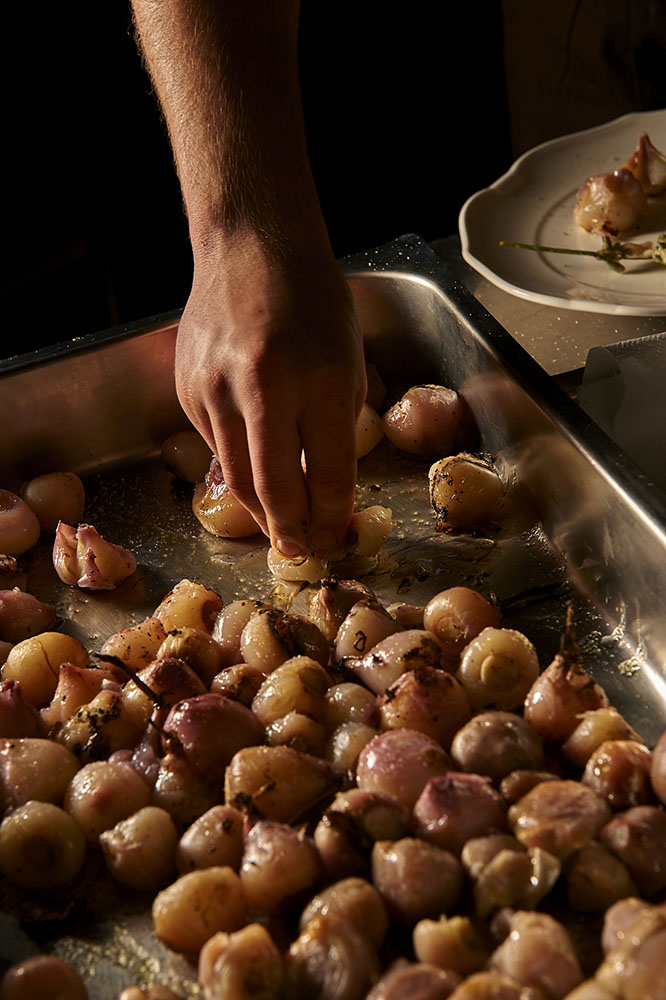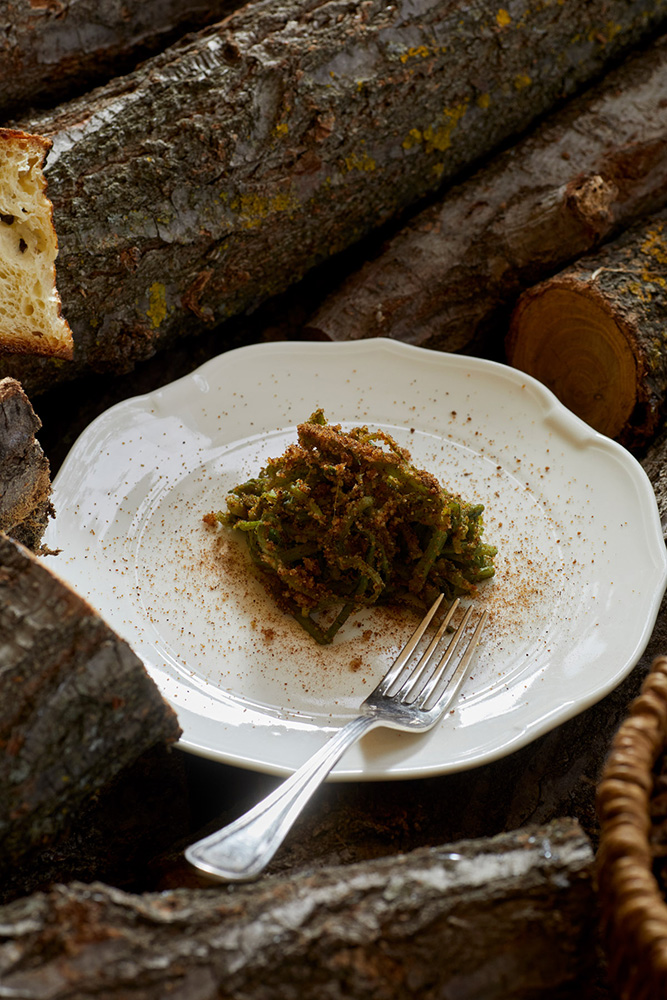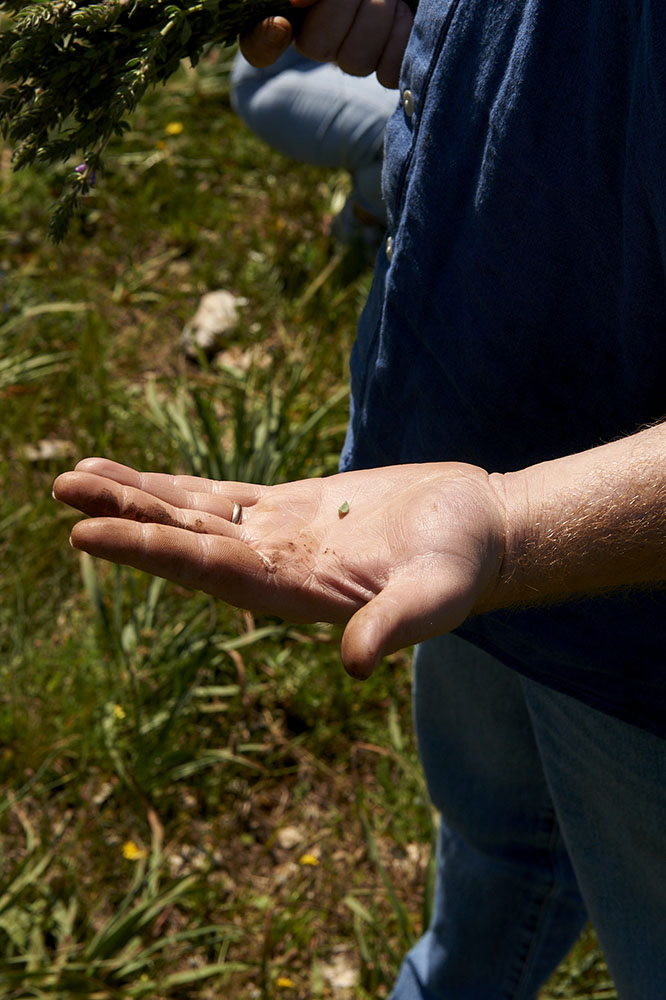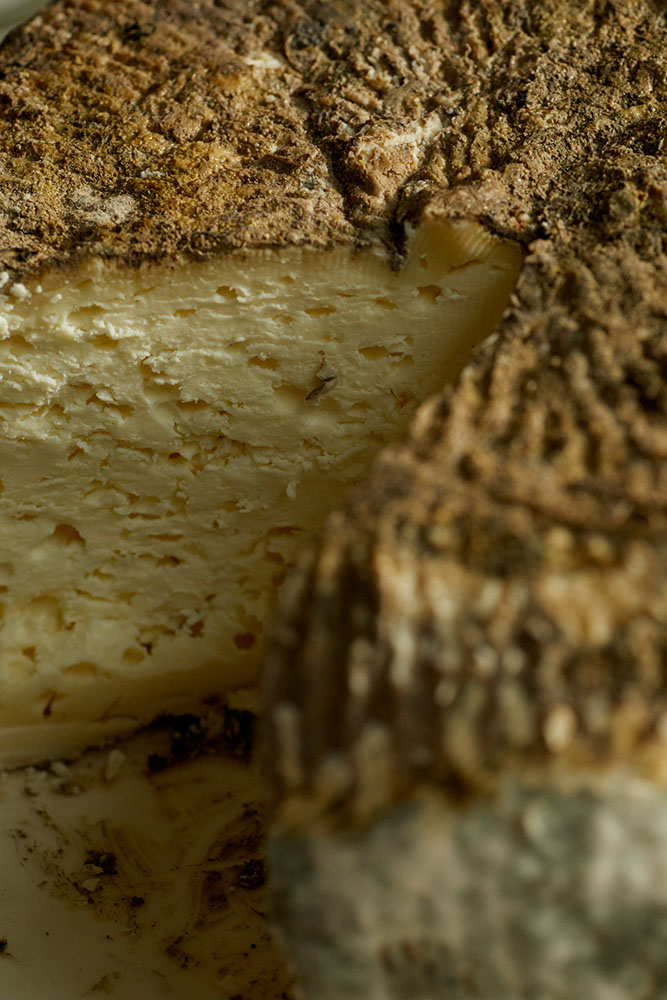


La filosofiaOur philosophy
Riscoprire il dialogo tra uomo e natura. Questa è la straordinaria visione dei fratelli Francesco e Vincenzo Montaruli. Il progetto di cucina etnobotanica riporta in tavola i sapori delle erbe spontanee e i profumi del parco della Murgia: la parte più viva di una memoria antropologica trasmessa oralmente per secoli.
La maggior parte degli ingredienti utilizzati sono frutto dell’autenticità della raccolta a mano. Una cucina sincera e introspettiva, scandita dall’alternarsi delle stagioni e dalla quotidianità di gesti rivolti alla terra: segreti che i fratelli tramandano agli ospiti.
I menù offrono un percorso composto da piatti interamente vegetali e altri di origine animale, accompagnati da una vasta selezione di vini. Il percorso si definisce a seconda della disponibilità dei prodotti offerti dalla quotidianità: la ricerca dei piccoli produttori locali e degli ingredienti di prima qualità sono protagonisti assoluti della cucina, dettando i ritmi e le scelte creative.
Scarica il menu. Rediscovering the dialogue between man and nature: this is the extraordinary vision of the brothers Francesco and Vincenzo Montaruli. The ethnobotanic cuisine project brings to the table the flavours of wild herbs and the scents of the Murgia National Park: the most vivid elements of an anthropological memory transmitted orally for centuries.
Most of the ingredients used are the result of authentic hand collection. A sincere and introspective cuisine marked by the passing of seasons and daily gestures, aimed at the land: secrets that the brothers pass on to the guests.
The tasting itinerary, based on these concepts, consists of different courses, depending on the availability of the products and inspired by the harvest of the day, accompanied by a great selection of wines. The research of small local producers and top-quality ingredients are the absolute protagonists of the kitchen, dictating the rhythms and creative choices.
Download the menu.
La maggior parte degli ingredienti utilizzati sono frutto dell’autenticità della raccolta a mano. Una cucina sincera e introspettiva, scandita dall’alternarsi delle stagioni e dalla quotidianità di gesti rivolti alla terra: segreti che i fratelli tramandano agli ospiti.
I menù offrono un percorso composto da piatti interamente vegetali e altri di origine animale, accompagnati da una vasta selezione di vini. Il percorso si definisce a seconda della disponibilità dei prodotti offerti dalla quotidianità: la ricerca dei piccoli produttori locali e degli ingredienti di prima qualità sono protagonisti assoluti della cucina, dettando i ritmi e le scelte creative.
Scarica il menu. Rediscovering the dialogue between man and nature: this is the extraordinary vision of the brothers Francesco and Vincenzo Montaruli. The ethnobotanic cuisine project brings to the table the flavours of wild herbs and the scents of the Murgia National Park: the most vivid elements of an anthropological memory transmitted orally for centuries.
Most of the ingredients used are the result of authentic hand collection. A sincere and introspective cuisine marked by the passing of seasons and daily gestures, aimed at the land: secrets that the brothers pass on to the guests.
The tasting itinerary, based on these concepts, consists of different courses, depending on the availability of the products and inspired by the harvest of the day, accompanied by a great selection of wines. The research of small local producers and top-quality ingredients are the absolute protagonists of the kitchen, dictating the rhythms and creative choices.
Download the menu.
StoriaHistory
Negli anni ’80, sin da quando erano bambini, Francesco e Vincenzo venivano accompagnati dal padre, un contadino, sull’Altopiano delle Murge, e imparavano ad “andar per campi”.
La missione dei fratelli è proprio quella di trasformare in arte culinaria tutti i suggerimenti per riconoscere piante e frutti avuti dal papà, il nonno e Ciccillo, raccoglitore di erbe spontanee. Così vengono abbattuti gli stereotipi e i pregiudizi che ancora oggi la cucina vegetale si porta dietro, legati al ricordo della miseria, al falso attributo di cucina povera e a un’epoca in cui i nostri antenati hanno utilizzato gli stessi ingredienti non per arte, ma per fame.
Infatti, non c’è esperienza più importante per Francesco e Vincenzo che quella di raccogliere e lavorare le ricchezze del territorio, come fanno sin dal 2013, quando hanno aperto il ristorante, Mezza Pagnotta. Credono fermamente che tutti saremmo in grado di procurarci autonomamente i vegetali necessari alla nostra dieta, se solo fossimo in grado di riconoscerli e rispettarli. Questa conoscenza però è sempre più rara e oggi bisogna prima di tutto imparare. Oggi tra le mura di Villa Fenicia, la loro cucina prende vita e anima i diversi luoghi dove viene portata in tavola la Murgia. In the '80s, since they were children, Francesco and Vincenzo were brought by their father, a farmer, on the Murgia Plateau, and learned “to stroll through the fields".
The brothers' mission is to transform into culinary art all the tips to recognize plants and fruits passed on by his father, his grandfather and Ciccillo, a spontaneous herb collector. This is how the stereotypes and prejudices that vegetable cooking still carries with it are destroyed, still linked to the memory of poverty, to the false attribute of poor cooking and to an era in which our ancestors used the same ingredients not for art, but for hunger.
In fact, there is no more important experience for Francesco and Vincenzo than collecting and working the richness of the territory, as they do since 2013, when they opened the restaurant Mezza Pagnotta. They firmly believe that we would all be able to independently obtain the necessary vegetables for our diet, if only we could recognize and respect them. However, this knowledge is increasingly rare and today we must learn first. Today within the walls of Villa Fenicia, their cuisine comes to life and animates the halls and gardens where the Murgia is brought to the table.
La missione dei fratelli è proprio quella di trasformare in arte culinaria tutti i suggerimenti per riconoscere piante e frutti avuti dal papà, il nonno e Ciccillo, raccoglitore di erbe spontanee. Così vengono abbattuti gli stereotipi e i pregiudizi che ancora oggi la cucina vegetale si porta dietro, legati al ricordo della miseria, al falso attributo di cucina povera e a un’epoca in cui i nostri antenati hanno utilizzato gli stessi ingredienti non per arte, ma per fame.
Infatti, non c’è esperienza più importante per Francesco e Vincenzo che quella di raccogliere e lavorare le ricchezze del territorio, come fanno sin dal 2013, quando hanno aperto il ristorante, Mezza Pagnotta. Credono fermamente che tutti saremmo in grado di procurarci autonomamente i vegetali necessari alla nostra dieta, se solo fossimo in grado di riconoscerli e rispettarli. Questa conoscenza però è sempre più rara e oggi bisogna prima di tutto imparare. Oggi tra le mura di Villa Fenicia, la loro cucina prende vita e anima i diversi luoghi dove viene portata in tavola la Murgia. In the '80s, since they were children, Francesco and Vincenzo were brought by their father, a farmer, on the Murgia Plateau, and learned “to stroll through the fields".
The brothers' mission is to transform into culinary art all the tips to recognize plants and fruits passed on by his father, his grandfather and Ciccillo, a spontaneous herb collector. This is how the stereotypes and prejudices that vegetable cooking still carries with it are destroyed, still linked to the memory of poverty, to the false attribute of poor cooking and to an era in which our ancestors used the same ingredients not for art, but for hunger.
In fact, there is no more important experience for Francesco and Vincenzo than collecting and working the richness of the territory, as they do since 2013, when they opened the restaurant Mezza Pagnotta. They firmly believe that we would all be able to independently obtain the necessary vegetables for our diet, if only we could recognize and respect them. However, this knowledge is increasingly rare and today we must learn first. Today within the walls of Villa Fenicia, their cuisine comes to life and animates the halls and gardens where the Murgia is brought to the table.
Il Parco Nazionale
dell’Alta MurgiaAlta Murgia National Park
dell’Alta MurgiaAlta Murgia National Park
La ricchezza e la biodiversità del Parco Nazionale dell’Alta Murgia (Puglia) è tutta da riscoprire.
Istituito parco nazionale nel 2004, nelle province di Bari e di Barletta-Andria-Trani, si estende per 68.000 ettari. L’aspetto naturalistico l'Alta Murgia è caratterizzato dalla presenza di due habitat principali: quello Festuco-Brometalia (formazioni erbose secche seminaturali e facies coperte da cespugli su substrato calcareo) e quello Thero-Brachypodietea (percorsi di graminacee e piante annue). Questi sono i panorami dove i fratelli Montaruli hanno incontrato il raccoglitore Ciccillo.
Ciccillo è l’uomo che ha fatto della raccolta di erbe considerate ormai rare uno stile di vita: “il mio tempo è uno e se lo passo a zappare mi perdo nel frattempo qualcosa che nasce spontaneamente”. È stato lui a svelare molti dei segreti della Murgia ai fratelli, che sin da piccoli sono stati educati a prestare grande attenzione a non calpestare i tesori offerti dalla campagna. Come la miniera di conoscenza che è Ciccillo continua a stupire i fratelli, i fratelli stupiscono gli ospiti del ristorante con i piatti la cui scrupolosità della preparazione è solo una parte del grande racconto di “archeologia del gusto” che ogni giorno si vive nel ristorante. The richness and biodiversity of the Alta Murgia National Park (Puglia) is meant to be rediscovered. The park, established in 2004 in the provinces of Bari and Barletta-Andria-Trani, it covers 68,000 hectares. The naturalistic aspect of the Alta Murgia is characterized by the presence of two main habitats: the Festuco-Brometalia (semi-natural dry grasslands and “facies” covered by bushes on calcareous substrate) and the Thero-Brachypodietea (paths of grasses and annual plants). These are the landscapes where the Montaruli brothers met the collector Ciccillo.
Ciccillo is the man who turned the hand collection of rare herbs into a lifestyle: "my time is one, and if I spend it hoeing, I miss something that is born spontaneously". He’s the one who revealed many of the secrets of the Murgia to the brothers, who were educated, from an early age, to pay great attention not to trample upon the treasures offered by the land. As the fountain of knowledge that is, Ciccillo continues to amaze the brothers. In turn, the brothers surprise the guests of the restaurant with the dishes, of which the scrupulousness of preparation is only part of the great story of "archaeology of taste" that every day is lived in the restaurant.
Istituito parco nazionale nel 2004, nelle province di Bari e di Barletta-Andria-Trani, si estende per 68.000 ettari. L’aspetto naturalistico l'Alta Murgia è caratterizzato dalla presenza di due habitat principali: quello Festuco-Brometalia (formazioni erbose secche seminaturali e facies coperte da cespugli su substrato calcareo) e quello Thero-Brachypodietea (percorsi di graminacee e piante annue). Questi sono i panorami dove i fratelli Montaruli hanno incontrato il raccoglitore Ciccillo.
Ciccillo è l’uomo che ha fatto della raccolta di erbe considerate ormai rare uno stile di vita: “il mio tempo è uno e se lo passo a zappare mi perdo nel frattempo qualcosa che nasce spontaneamente”. È stato lui a svelare molti dei segreti della Murgia ai fratelli, che sin da piccoli sono stati educati a prestare grande attenzione a non calpestare i tesori offerti dalla campagna. Come la miniera di conoscenza che è Ciccillo continua a stupire i fratelli, i fratelli stupiscono gli ospiti del ristorante con i piatti la cui scrupolosità della preparazione è solo una parte del grande racconto di “archeologia del gusto” che ogni giorno si vive nel ristorante. The richness and biodiversity of the Alta Murgia National Park (Puglia) is meant to be rediscovered. The park, established in 2004 in the provinces of Bari and Barletta-Andria-Trani, it covers 68,000 hectares. The naturalistic aspect of the Alta Murgia is characterized by the presence of two main habitats: the Festuco-Brometalia (semi-natural dry grasslands and “facies” covered by bushes on calcareous substrate) and the Thero-Brachypodietea (paths of grasses and annual plants). These are the landscapes where the Montaruli brothers met the collector Ciccillo.
Ciccillo is the man who turned the hand collection of rare herbs into a lifestyle: "my time is one, and if I spend it hoeing, I miss something that is born spontaneously". He’s the one who revealed many of the secrets of the Murgia to the brothers, who were educated, from an early age, to pay great attention not to trample upon the treasures offered by the land. As the fountain of knowledge that is, Ciccillo continues to amaze the brothers. In turn, the brothers surprise the guests of the restaurant with the dishes, of which the scrupulousness of preparation is only part of the great story of "archaeology of taste" that every day is lived in the restaurant.

Il nostro vino è vivoOur wine is full of life
Il vino è un viaggio fatto di emozioni attraverso territori, tradizioni e storie di vita. La nostra selezione di vini artigianali è un itinerario che inizia dal luogo in cui il vino è prodotto ed è primo fedele testimone, più di altri prodotti, dell’interazione tra uomo e natura.
The wine is a long journey made of emotions through territories, traditions and life stories. Our selection of natural wines is a travel that starts in the place where the wine is made in order to outline its ability, more than other products, to report the interaction between man and nature.
Prenota un tavoloBook your table
















